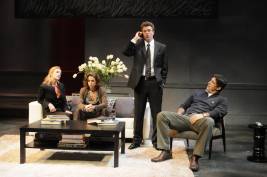
Long Beach’s International City Theater trumps the competition with its 2012 season opener of Yasmina Reza’s Tony-winning Best Play of 2009 God Of Carnage, a production which, while not technically its West Coast Premiere (Center Theatre Group got that honor by merely importing the Broadway team), nonetheless merits true event status for being built entirely from the ground up—brand new actors, a brand new director, and a brand new team of designers, all of them doing bang-up work on the ICT stage.
Reza’s hilariously edgy comedy examines the savage in even the most sophisticated and socially domesticated of us all when manners are forgotten and the gloves come off—helped along by copious amounts of rum.
The civilized savages are Alan and Annette Raleigh (David Nevell and Alet Taylor) and Michael and Veronica Novak (Greg Derelian and Leslie Stevens), the former of whom have come to pay the Novaks a visit, though one can hardly term it a social call. It seems that the Raleighs’ eleven-year-old son Benjamin has struck the Novaks’ Henry in the face, resulting in “a swelling of the upper lip, the breaking of two incisors, including injury to the right incisor.”
The above comes from the statement Michael and Veronica have prepared and now want Alan and Annette to sign, the aggrieved parents’ attempt at some sort of closure to the playground incident.
Though writer/book shop employee Veronica seems at first to be the most levelheaded and businesslike of the bunch, she’s also the one least likely to accept a signed statement as sufficient recompense for what she considers Benjamin’s unprovoked attack on her innocent child.
Mousy wealth manager Annette seems initially entirely too cowed by her husband and timid among strangers to do anything other than get sick to her stomach. We soon learn, however, that still waters run deep once Annette has had a few glasses of rum and been forced to listen to a few too many of Alan’s incessant cell phone calls.
Corporate lawyer Alan seems entirely unconcerned with his son’s misbehavior, viewing him as the savage he is, and seeing any attempt to change him as a waste of his time, time which would be far better spent on the phone conducting lawyer business, place or circumstances be damned—and woe to anyone who overhears these “private conversations.”
Meanwhile domestic hardware dealer Michael takes a boys-will-be-boys attitude to the incident, confessing that he himself once led his own elementary school gang just as the Raleigh’s son does today, a revelation which doesn’t sit well with Veronica at all.
After about ten or fifteen minutes of small talk, haggling, and splitting hairs over words—Was Benjamin “armed” with a stick, or simply “furnished?” Is Henry’s lip “disfigured,” or only temporarily “swollen?”—and nothing particularly resolved, the Raleighs prepare to depart, a meeting between their son and the Novaks’ to take place at some as yet unspecified time in the near future.
Obviously Alan and Annette stick around, or there would be no God Of Carnage, and one of the play’s pleasures is observing Reza’s expertise at finding ways to keep the Raleighs chez the Novaks for another hour or so, during which time married audience members will likely find at least one character whose attitudes and actions hit (perhaps too) close to home.
First and foremost, however, God Of Carnage is a comedy, albeit a dark one, and Reza mines laughs and gasps aplenty from a discarded hamster, some not-quite-ruined coffee table books, a grandmother’s blood pressure medication, and a pair of cigars about to be smoked in the home of an asthmatic child—not to mention an onstage brawl or two.
Reza not only gets us to laughing, she gets us to thinking about male-female, male-male, and female-female relationships, as each one of her cast of four finds him-or-herself at some time or another allied with one or the other of the remaining three, whether attacking a spouse or defending his-or-her gender—or vice versa.
Up till now, a good deal of God Of Carnage’s popular success has come from star power—Isabelle Huppert in Paris, Ralph Fiennes in London, and Jeff Daniels, Hope Davis, James Gandolfini, and Marcia Gay Harden in New York and L.A.
The ICT foursome may be less well known than their predecessors, but having beat out hundreds upon hundreds of competitors in nabbing four of the meatiest roles in town, there’s not a weak link among them. Nevell is so authentic as arrogant, work-obsessed Alan that audience members will be tempted to either smash that darned cell phone to smithereens, or hire him as the best legal representation in town. Derelian makes rough, tough Michael equally real, bulging muscles scarcely concealed under a rugby shirt and blue-collar vowels revealing his roots, making this macho man’s fear of rodents all the droller. As for the women, director caryn desai (doing some of her best work here) took a bit of a chance on a pair of StageSceneLA Award-winning musical theater stars, but it is a risk that has paid off. The always fabulous Stevens, who won a Best Featured Actress Scenie for her scene-stealing roles in Divorce: The Musical, gives high-energy, high-maintenance Veronica a steely command and determination beneath a disintegrating guise of civility. Taylor won her Best Featured Actress Scenie as one of the finest and funniest Guys And Dolls Adelaides ever. Now, as Annette, Taylor goes from mousy to queasy to tipsy to “No More Miss Nice Girl” in a richly layered performance that, like Stevens’, ought to open many legitimate acting doors in months to come.
Stephen Gifford’s thirteenth ICT scenic design is one of his snazziest, an elegant, gray-toned living room behind and atop which hangs an enormous blackboard filled with chalk squiggles destined to provoke conversation. (Do they represent the two boys’ school? The chaos of their parents’ interactions?) Jeremy Pivnick lights Gifford’s set with accustomed expertise while resident property designers Gordon and Patty Briles fill it with just-right props, one of which serves its secret purpose quite niftily. Chris Kittrell’s sound design punctuates the evening with cell phone and land line buzzes and rings aplenty. Resident costume designer Kim DeShazo gives each character an outfit that cues us in to who he or she is (at least on the surface) before they’ve even begun to speak. Michael Donovan, CSA, is resident casting director. Pat Loeb is production stage manager.
Southern Californians can expect to see numerous future productions of God Of Carnage as rights are released to regional, 99-seat, and community theaters—and I look forward to seeing many of them. Admittedly, Reza doesn’t quite find a way to end God Of Carnage as satisfactorily as one might wish, but that’s hardly reason not to savor eighty of the juiciest stage minutes of recent years. If their 2012 opener is any indication, International City Theatre is in for one smashing season of shows.
International City Theatre, Long Beach Performing Arts Center, 300 E. Ocean Blvd., Long Beach. www.InternationalCityTheatre.org
–Steven Stanley
February 2, 2012
Photos: Carlos Delgado





 Since 2007, Steven Stanley's StageSceneLA.com has spotlighted the best in Southern California theater via reviews, interviews, and its annual StageSceneLA Scenies.
Since 2007, Steven Stanley's StageSceneLA.com has spotlighted the best in Southern California theater via reviews, interviews, and its annual StageSceneLA Scenies.







 COPYRIGHT 2025 STEVEN STANLEY :: DESIGN BY
COPYRIGHT 2025 STEVEN STANLEY :: DESIGN BY